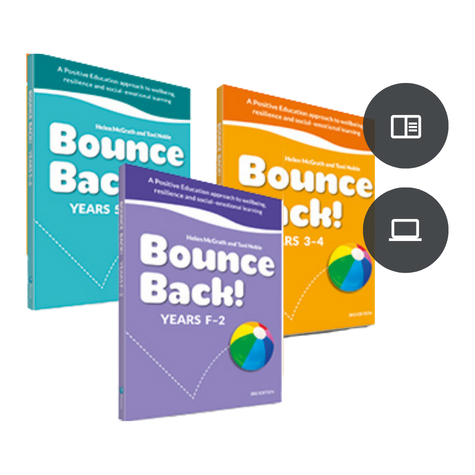Overview
Increasing numbers of children are struggling with emotional and social needs that adversely affect their learning. Bounce Back! is an evidence-informed Positive Education program built on Positive Psychology, Cognitive Behaviour Theory and social-emotional learning.
-
Year Levels F–6
-
Curriculum ACT, NSW, NT, QLD, SA, TAS, VIC, WA, NZ
-
Subject Wellbeing
-
Resource Formats Print, Digital
What it is
Bounce Back! is a whole-school program for years F–6. It uses blended learning and provides teachers with practical strategies to explicitly teach wellbeing and resilience skills to help students ‘bounce back’ and cope with the complexity of everyday life.
Each level contains the most recent evidence-based research plus ten curriculum units with teaching strategies and practical resource.
What it includes
Discover how Bounce Back! improves student wellbeing.
Series overview
Handbook
Each resource has a Handbook section which explores:
- the most recent evidence-based research that underpins Bounce Back!
- the 10 curriculum units
- student and teacher wellbeing
- social, emotional and coping skills for wellbeing and resilience
- the BOUNCE BACK! acronym
- how to implement, maintain and embed practices.
It also includes Positive Education, CASEL and Australian and state-based curriculum linkages.
Series overview
Curriculum units
Bounce Back! includes 10 curriculum units with teaching strategies and practical resources covering:
- Core values
- Social values
- People bounce back
- Courage
- Looking on the bright side
- Emotions
- Relationships
- Humour
- Being safe
- Success.
Each curriculum unit uses children’s literature, videos, songs, thinking tools and cooperative learning strategies plus a variety of cross-curricular classroom activities to engage and help students:
- develop positive and prosocial values
- develop self-awareness, social awareness and social skills
- develop self-management strategies
- think optimistically
- boost positive emotions and manage negative emotions
- find courage in everyday life and difficult circumstances
- develop skills for countering bullying
- use humour as a coping tool
- develop strengths, skills and attitudes for being successful.
Series overview
eBooks
Each level includes print plus an eBook. The eBooks are also available for standalone purchase. The eBooks include a wealth of digital and downloadable content, including:
- tools for measuring wellbeing and resilience
- an extra Science and Maths curriculum unit
- curriculum correlation and scope and sequence charts
- resource lists for each curriculum unit
- interactive tools, games and activities
- blackline masters, interactive tools, games and activities
- information for families.
Series overview
Whole School Resource Pack
This pack is ideal for schools looking for a whole school program with eBook access for all teachers on the school network. It includes:
- a whole school, single campus digital licence for all 3 titles
- 4 copies of Bounce Back! Years F to 2
- 3 copies of Bounce Back! Years 3 to 4
- 3 copies of Bounce Back! Years 5 to 6
Professional development
Webcast: Implement with success in your classroom
Date recorded: July 2024
Bounce Back! Implement With Success In Your Classroom is a free webcast offering practical tips to support your implementation of Bounce Back! It helps you gain a strong understanding of the program’s core structure and curriculum units, confidently incorporate literature, and effectively use Bounce Back! to foster student wellbeing and resilience.
Professional development
Webcast: For School Leadership and Wellbeing Coordinators
Date recorded: July 2024
Bounce Back! For School Leadership and Wellbeing Coordinators is a free webcast designed to help school leaders coach and sustain the implementation of Bounce Back! across the entire school, effectively fostering student wellbeing and resilience.
Additional resources
Videos
These free videos from Sprout Wellbeing are aimed at middle to upper primary students. They can be used to generate general discussions around wellbeing and resilience, setting the scene for the curriculum units, and also include activities for developing skills in resilience.
The videos support you to:
- introduce and teach the BOUNCE BACK acronym of coping statements
- build students’ resilience and coping skills
- generate safe classroom discussions
- develop shared class language and understanding about resilience.
It is recommended that you pause the videos where indicated, or as often as needed to generate robust classroom discussions.
Additional resources
Video one: B
Bad times don’t last. Things always get better. Stay optimistic.
This video explores how to bounce back from a difficult situation by working at being hopeful.
Key vocabulary: hope/ful/, hope/less, negative, optimism/optimistic, pessimism/pessimistic, positive, un/realistic
Additional resources
Video two: O
Other people can help if you talk to them. Get a reality check.
This video is about the importance of tapping into different people for help and how to give your worries a reality check.
Key vocabulary: evidence, expertise, fact/reality check, opinion, perception, source, worries
Additional resources
Video three: U
Unhelpful thinking makes you feel more upset. Think again.
This video explores the differences between helpful and unhelpful thinking when tackling problems or difficult situations.
Key vocabulary: choice, exaggerating, generalising, helpful, negative, optimism, over simplifying, pessimistic, positive, un/helpful
Additional resources
Video four: N
Nobody is perfect – not you and not others.
This video explores how no-one is perfect – even if it might look like it from the outside.
Key vocabulary: anxious, critical, myth, perfect/ion, perfection/ist/ism, pressure, setback, un/realistic
Additional resources
Video five: C
Concentrate on the positives (no matter how small) and use laughter.
This video is about finding something positive or even funny in difficult situations, rather than focusing on the negatives.
Key vocabulary: concentrate, critical, difficult, hope/ful, laugh/laughter, negative/s, perspective, positive/s, positive tracker
Additional resources
Video six: E
Concentrate on the positives (no matter how small) and use laughter.
This video is about finding something positive or even funny in difficult situations, rather than focusing on the negatives.
Key vocabulary: concentrate, critical, difficult, hope/ful, laugh/laughter, negative/s, perspective, positive/s, positive tracker
Resilience activities
Overview
The following articles, written by Bounce Back! author Dr Toni Noble, provide parents and teachers with wellbeing tools, tips and activities for primary school-aged children to build resilience and wellbeing during challenging times.
Resilience activities
Boosting positive emotions
Positive emotions help reverse the negative effects of stress. While it’s normal to experience challenging emotions when stressed, this article suggests ideas to boost children’s positive emotions.
Resilience activities
Staying connected
Social distancing is about physical separation, not social disconnection. The activities in this article encourage primary school-aged children to have a fun, interesting and purposeful conversation with a friend or classmate via phone or video.
Resilience activities
Being kind, being thankful
Practising kindness and feeling gratitude for others’ kindness not only builds stronger relationships with those around us – it improves our sense of wellbeing and happiness.
Resilience activities
Look for the silver lining
We can usually find something good in a bad situation if we try. This article explores how looking for small, good things can help children become more hopeful.
Samples & downloads
- Bounce Back! Years F-2: Contents Download PDF (670KB)
- Bounce Back! Years F-2: Sample Download PDF (448KB)
- Bounce Back! Years 3-4: Contents Download PDF (672KB)
- Bounce Back! Years 3-4: Sample Download PDF (505KB)
- Bounce Back! Years 5-6: Contents Download PDF (655KB)
- Bounce Back! Years 5-6: Sample Download PDF (613KB)
- Pearson Wellbeing Resources — Correlation Guide — Building Connections & Bounce Back! Download PDF (268KB)












